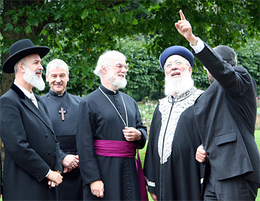Archbishop of Canterbury meets with Chief Rabbis of Israel
 Archbishop with Chief Rabbis of Israel, Lambeth Palace
Archbishop with Chief Rabbis of Israel, Lambeth PalaceWednesday 10th September 2008
The Archbishop of Canterbury, Dr Rowan Williams, yesterday met with the Chief Rabbis of Israel, Chief Rabbi Shlomo Amar and Chief Rabbi Yonah Metzger.The following communiqué was signed:
Communiqué of The Third Meeting of the Chief Rabbis of Israel and the Archbishop of Canterbury
The third meeting of the Chief Rabbis of Israel and the Archbishop of Canterbury was held on 9th September 2008/9th Elul 5768, fulfilling the provisions of the Joint Declaration signed by them on 5th September 2006/12th Elul 5766.
The Most Revd Dr Williams, Archbishop of Canterbury, Chief Rabbi Shlomo Amar and Chief Rabbi Yonah Metzger of Israel met in Lambeth Palace. The Chief Rabbis were supported by Mr Oded Wiener, Director General of the Chief Rabbinate of Israel, whilst the Archbishop was supported by the Rt Revd Michael Jackson, Bishop of Clogher and Co-Chair of the Anglican Jewish Commission, and the Rt Revd Suheil Dawani, Anglican Bishop in Jerusalem.
"We feel keenly the absence of Rabbi David Rosen who was not able to be present because of a family bereavement and express our condolences and prayers for him, his wife and their family. We also wish to acknowledge, with gratitude, the work of Canon Guy Wilkinson who has supported our meetings and those of our Anglican Jewish Commission since their inception.
"We are encouraged by the further steps we have taken, under God, to build up the trust and mutual understanding that have characterised our encounter. We have heard from members of our Anglican Jewish Commission of the special relationship that has developed in their meetings and received with gratitude the report of their work on the holiness of person, place and time. The Commission's meeting in Canterbury this year during the Lambeth Conference gave it a special character. We were delighted to hear of the warm appreciation shown by the bishops of the Anglican Communion and their spouses for the address on the theme of "Covenant" by Sir Jonathan Sacks, the Chief Rabbi of the United Hebrew Congregations of the Commonwealth – an historic address as the first by a Chief Rabbi to the decennial Lambeth Conference.
"In our deliberations on the work of the Commission we reflected on the issues surrounding holy places and found helpful the analogy of them being an "Embassy of God". It is important that holy sites are universally recognised as places that are free from violence, whether this is from external threats to security and access or from the use within them of language which incites violence. We recognise the particular burden this places on religious leaders to encourage their faithful to show respect and understanding towards other Faiths and their holy sites. Religious sites should be a beacon of that which builds up peace and the common good.
"Therefore, we extend a call to all community leaders, political and religious, to work to ensure that in all areas where they have influence there is no incitement to religious or racial hatred. In this context we are distressed to note that the President of Iran continues to use threatening and derogatory language towards Israel.
"We express our deep sorrow at news of the death, since our last meeting, of two of the hostages for whose release we had called and renew our call for the release of Gilad Shalit. We continue to call for a comprehensive peace in the Middle East.
"We affirm and support the work of the Council of Religious Institutions of the Holy Land and were pleased to receive positive reports of its ongoing meetings. We view these as a fine example of the possibilities and value in multi-religious discussion. In our deliberations we have touched on a number of issues which we believe it would be helpful for the Council to consider, amongst them the distress caused to families locally by inter-religious marriages and the sensitivity with which archaeological and construction work affecting religious sites is conducted in Jerusalem.
"In a spirit of understanding we took the opportunity to review a number of other issues of mutual concern in Israel, England and more widely. We affirmed the value of the work of volunteers in religious projects and undertook to explore the related visa issues with the Israeli Ministry of Foreign Affairs.
"We concluded our time together sharing a meal, a sign of the growing friendship that exists between us and to which we reassert our commitment. The more consistently we are able to speak with one voice on the huge variety of issues facing today's society the greater will be our influence in building a peaceful future. We look forward to exploring this further at our meeting in Jerusalem in 2009."
